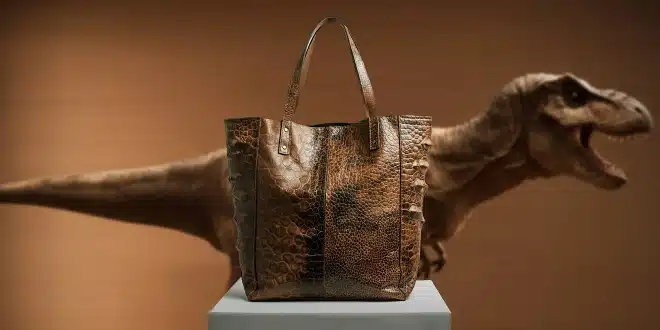A consortium of biotechnology firms and a creative agency has announced an ambitious initiative to develop lab-grown leather derived from the collagen of Tyrannosaurus rex fossils. The collaboration, involving VML, Lab-Grown Leather Ltd., and The Organoid Company, aims to produce a sustainable and cruelty-free alternative to traditional leather, targeting the luxury fashion market.
Engineering Leather from Ancient Proteins
The project centers on reconstructing T. rex collagen sequences from fossilized remains. By analyzing preserved protein fragments, researchers intend to synthesize DNA that codes for these ancient proteins. This synthetic DNA will then be introduced into specially engineered cells, prompting them to produce collagen structurally similar to that found in T. rex skin. The resulting material is expected to mimic the durability and texture of conventional leather.
The production process employs a scaffold-free tissue engineering technique, allowing cells to self-organize into dense collagen structures without external frameworks. This method is designed to replicate the natural formation of skin layers, potentially yielding a material that closely resembles animal-derived leather in both form and function.
The consortium plans to debut its first product—a luxury handbag made from this lab-grown T. rex leather—by the end of 2025. Future applications may extend to other sectors, including automotive interiors and furniture upholstery.
Scientific Skepticism and Challenges
Despite the project’s innovative approach, several experts have expressed doubts about its feasibility. Paleontologist Mary Higby Schweitzer has noted that leather production involves not only collagen but also keratin, a protein prevalent in skin, which has not been recovered from T. rex fossils. Additionally, she points out the scarcity of well-preserved dinosaur skin samples, which complicates efforts to accurately replicate the original material.
Synthetic biologist Christina Agapakis has suggested that while reconstructing collagen sequences from fossilized fragments is theoretically possible, the absence of complete DNA sequences from extinct species like T. rex poses significant challenges. She emphasizes the complexity of reverse-engineering genetic material from limited and degraded sources.
Moreover, the oldest DNA successfully extracted and sequenced to date is approximately 2 million years old, whereas T. rex became extinct around 66 million years ago. This vast temporal gap raises questions about the authenticity of any material claimed to be derived directly from T. rex DNA.
Ethical and Environmental Considerations
Proponents of the project highlight its potential environmental benefits. Traditional leather production is associated with significant ecological impacts, including deforestation, greenhouse gas emissions, and water pollution from tanning processes. By contrast, lab-grown leather could offer a more sustainable alternative, reducing reliance on livestock and minimizing environmental degradation.
The initiative also addresses ethical concerns related to animal welfare. By eliminating the need for animal hides, lab-grown leather presents a cruelty-free option for consumers seeking ethically produced luxury goods.
While the concept of T. rex leather captures public imagination, the scientific and technical hurdles remain substantial. The project’s success will depend on advancements in synthetic biology and tissue engineering, as well as the ability to overcome skepticism within the scientific community.
As the consortium progresses toward its goal, the endeavor serves as a case study in the intersection of biotechnology, ethics, and consumer products, illustrating both the possibilities and limitations of reimagining materials from the distant past for modern applications.


